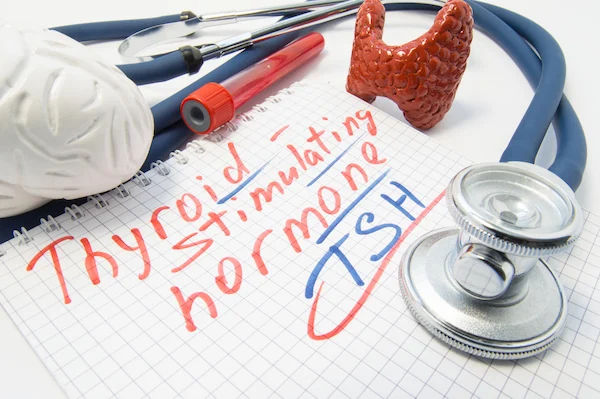Normal TSH Levels for Women Explained
Know about the thyroid-stimulating hormone, normal levels, fluctuations, when to get the test done and management of the diseases.

Written by Dr. Siri Nallapu
Reviewed by Dr. Dhankecha Mayank Dineshbhai MBBS
Last updated on 8th Aug, 2025

Introduction
Maintaining good thyroid health is essential for overall well-being, especially for women. The thyroid-stimulating hormone (TSH) plays a crucial role in regulating thyroid function, which affects metabolism, energy levels, and even mood. Understanding TSH levels can help women recognise potential thyroid issues early and take the necessary steps to stay healthy.
In this article, we’ll explain what TSH levels mean, what’s considered normal for women, and how to manage thyroid health effectively.
What is TSH?
TSH (Thyroid-Stimulating Hormone) is a hormone produced by the pituitary gland in the brain. Its main job is to signal the thyroid gland (located in the neck) to produce two key hormones:
- Thyroxine (T4)
- Triiodothyronine (T3)
These hormones regulate metabolism, body temperature, heart rate, and energy levels. If TSH levels are too high or too low, it indicates that the thyroid may not be functioning properly.
What Are Normal TSH Levels for Women?
TSH levels can vary slightly depending on age, health conditions, and even pregnancy. Generally, the normal range for women is:
Non-pregnant women: 0.4 to 4.0 mIU/L (milli-international units per litre)
Pregnant women:
- First trimester: 0.1 to 2.5 mIU/L
- Second trimester: 0.2 to 3.0 mIU/L
- Third trimester: 0.3 to 3.0 mIU/L
Consult a General Practitioner for Test Queries of TSH
Why Do TSH Levels Change in Women?
Women are more likely than men to experience thyroid imbalances due to factors such as:
- Pregnancy (hormonal changes affect thyroid function)
- Menopause (hormonal shifts can impact TSH levels)
- Autoimmune disorders (like Hashimoto’s or Graves’ disease)
- Age (TSH levels tend to rise slightly with age
What Happens if TSH Levels Are Abnormal?
1. High TSH (Hypothyroidism – Underactive Thyroid)
When TSH is above 4.0 mIU/L, it means the thyroid isn’t producing enough hormones. Common symptoms include:
- Fatigue and sluggishness
- Weight gain
- Dry skin and hair loss
- Feeling cold often
- Depression or mood swings
- Constipation
Management:
Medication (like levothyroxine) can help balance hormone levels. Eating a balanced diet rich in selenium, zinc, and iodine (found in nuts, seafood, and dairy) and regular exercise boost metabolism.
2. Low TSH (Hyperthyroidism – Overactive Thyroid)
When TSH is below 0.4 mIU/L, the thyroid is producing too much hormone. Symptoms may include:
- Rapid weight loss
- Anxiety or irritability
- Fast heartbeat (palpitations)
- Excessive sweating
- Trouble sleeping
- Frequent bowel movements
Management:
The management of RA includes the use of medications, lifestyle changes and adequate use of mineral-rich foods.
- Anti-thyroid medications or radioactive iodine therapy may be needed.
- Limiting caffeine and stress can worsen symptoms.
- Eating calcium and vitamin D-rich foods (like leafy greens and dairy) to support bone health.
Get Your Health Assessed
When Should You Get Tested?
Women should consider a TSH test if they experience:
- Unexplained weight changes
- Extreme fatigue
- Hair thinning or dry skin
- Irregular menstrual cycles
- Mood disorders (anxiety or depression)
Pregnant women should monitor TSH levels, as imbalances can affect fetal development.
How to Maintain Healthy TSH Levels?
1. Eat a Thyroid-Friendly Diet
- Iodine-rich foods: Seafood, dairy, eggs, and iodised salt.
- Selenium sources: Brazil nuts, sunflower seeds, fish.
- Zinc-rich foods: Chickpeas, lentils, and pumpkin seeds.
2. Exercise Regularly
- Moderate activity helps regulate metabolism and hormone balance.
3. Manage Stress
- Chronic stress can disrupt thyroid function. Try yoga, meditation, or deep breathing exercises.
4. Get Enough Sleep
- Poor sleep affects hormone production. Aim for 7-8 hours per night.
5. Avoid Smoking & Excessive Alcohol
- Both can interfere with thyroid function.
When to See a Doctor?
If you suspect a thyroid issue, consult a doctor for:
- A TSH blood test (simple and quick).
- Further tests like Free T3, Free T4, or thyroid antibodies, if needed.
- Personalised treatment plans if levels are abnormal.
Final Thoughts
Understanding TSH levels helps women stay proactive about their thyroid health. Small lifestyle changes, timely testing, and medical guidance can make a big difference in managing thyroid imbalances effectively.
Consult a General Practitioner for Test Queries of TSH
Consult a General Practitioner for Test Queries of TSH

Dr. Bulbul Biswas
General Practitioner
35 Years • MBBS, Diploma in Maternity and child welfare
Kolkata
HERSTEL CARE CLINIC, Kolkata

Dr Venkata Naga Sai Tribhushan Rambhatla
General Physician
3 Years • MBBS
Bengaluru
PRESTIGE SHANTHINIKETAN - SOCIETY CLINIC, Bengaluru

Dr Syed Mateen Pasha
General Physician
2 Years • MBBS
Bengaluru
PRESTIGE SHANTHINIKETAN - SOCIETY CLINIC, Bengaluru
Dr. Sayeedur Rahman
General Practitioner
1 Years • MBBS
Kolkata
Wellness Health Point, Kolkata

Dr. Arthi S
Family Physician
3 Years • MBBS
Bengaluru
PRESTIGE SHANTHINIKETAN - SOCIETY CLINIC, Bengaluru
Consult a General Practitioner for Test Queries of TSH

Dr. Bulbul Biswas
General Practitioner
35 Years • MBBS, Diploma in Maternity and child welfare
Kolkata
HERSTEL CARE CLINIC, Kolkata

Dr Venkata Naga Sai Tribhushan Rambhatla
General Physician
3 Years • MBBS
Bengaluru
PRESTIGE SHANTHINIKETAN - SOCIETY CLINIC, Bengaluru

Dr Syed Mateen Pasha
General Physician
2 Years • MBBS
Bengaluru
PRESTIGE SHANTHINIKETAN - SOCIETY CLINIC, Bengaluru
Dr. Sayeedur Rahman
General Practitioner
1 Years • MBBS
Kolkata
Wellness Health Point, Kolkata

Dr. Arthi S
Family Physician
3 Years • MBBS
Bengaluru
PRESTIGE SHANTHINIKETAN - SOCIETY CLINIC, Bengaluru





